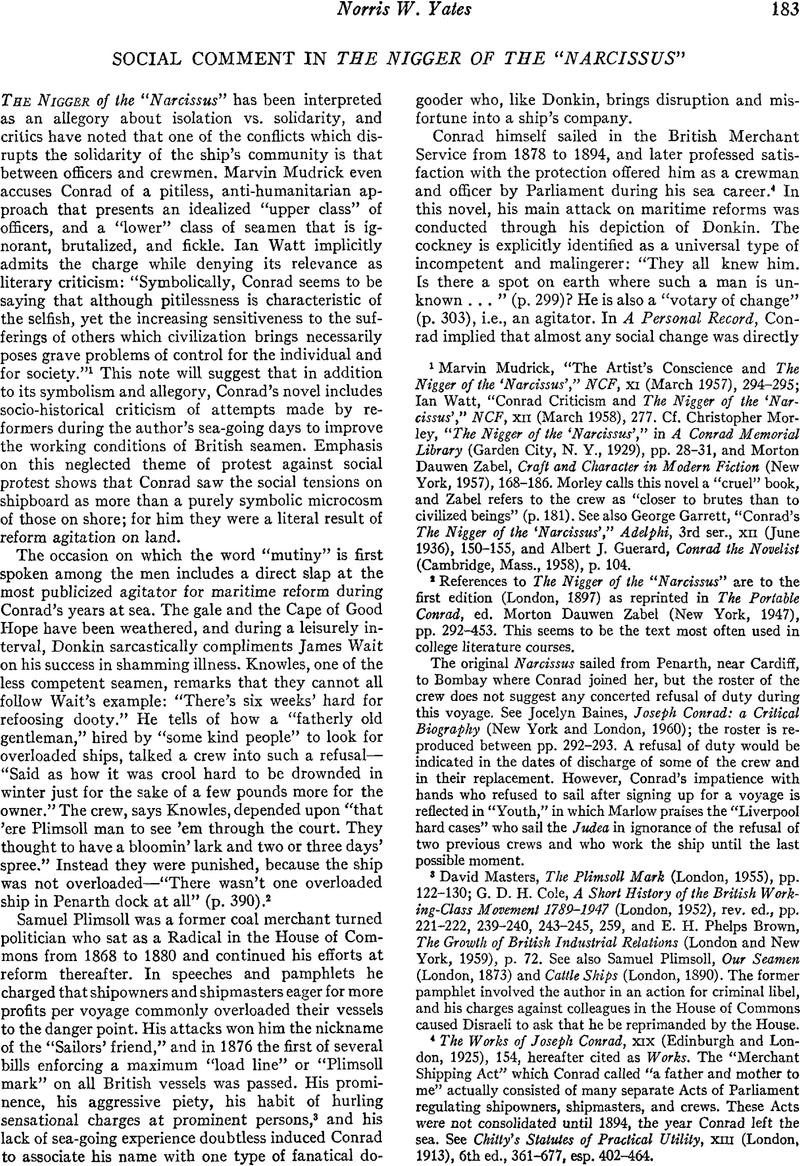No CrossRef data available.
Published online by Cambridge University Press: 02 December 2020

1 Marvin Mudrick, “The Artist's Conscience and The Nigger of the ‘Narcissus’,” NCF, xi (March 1957), 294–295; Ian Watt, “Conrad Criticism and The Nigger of the ‘Narcissus’,” NCF, XII (March 1958), 277. Cf. Christopher Morley, “The Nigger of the ‘Narcissus’,” in A Conrad Memorial Library (Garden City, N. Y., 1929), pp. 28–31, and Morton Dauwen Zabel, Craft and Character in Modern Fiction (New York, 1957), 168–186. Morley calls this novel a “cruel” book, and Zabel refers to the crew as “closer to brutes than to civilized beings” (p. 181). See also George Garrett, “Conrad's The Nigger of the ‘Narcissus’,” Adelphi, 3rd ser., xii (June 1936), 150–155, and Albert J. Guerard, Conrad the Novelist (Cambridge, Mass., 1958), p. 104.
2 References to The Nigger of the “Narcissus” are to the first edition (London, 1897) as reprinted in The Portable Conrad, ed. Morton Dauwen Zabel (New York, 1947), pp. 292–453. This seems to be the text most often used in college literature courses.
The original Narcissus sailed from Penarth, near Cardiff, to Bombay where Conrad joined her, but the roster of the crew does not suggest any concerted refusal of duty during this voyage. See Jocelyn Baines, Joseph Conrad: a Critical Biography (New York and London, 1960); the roster is reproduced between pp. 292–293. A refusal of duty would be indicated in the dates of discharge of some of the crew and in their replacement. However, Conrad's impatience with hands who refused to sail after signing up for a voyage is reflected in “Youth,” in which Marlow praises the “Liverpool hard cases” who sail the Judea in ignorance of the refusal of two previous crews and who work the ship until the last possible moment.
3 David Masters, The Plimsoll Mark (London, 1955), pp. 122–130; G. D. H. Cole, A Short History of the British Working-Class Movement 1789–1947 (London, 1952), rev. ed., pp. 221–222, 239–240, 243–245, 259, and E. H. Phelps Brown, The Growth of British Industrial Relations (London and New York, 1959), p. 72. See also Samuel Plimsoll, Our Seamen (London, 1873) and Cattle Ships (London, 1890). The former pamphlet involved the author in an action for criminal libel, and his charges against colleagues in the House of Commons caused Disraeli to ask that he be reprimanded by the House.
4 The Works of Joseph Conrad, xix (Edinburgh and London, 1925), 154, hereafter cited as Works. The “Merchant Shipping Act” which Conrad called “a father and mother to me” actually consisted of many separate Acts of Parliament regulating shipowners, shipmasters, and crews. These Acts were not consolidated until 1894, the year Conrad left the sea. See Chitty's Statutes of Practical Utility, xiii (London, 1913), 6th ed., 361–677, esp. 402–464.
5 Works, ix, xxi–xxii; also Joseph Conrad: Life and Letters, ed. G. Jean-Aubry, i (New York, 1927), 84. In The Rover, Conrad associated progress, piracy, and the French Revolution.
6 This contrast is discussed by Thomas Moser, Joseph Conrad: Achievement and Decline (Cambridge, Mass., 1957), p. 69, and Vernon Young, “Trial by Water: Joseph Conrad's The Nigger of the ‘Narcissus’,” Accent, xii (Spring 1952), 69 f.
7 Bad provisions for seamen were one of Plimsoll's targets (Masters, pp. 256–257).
8 “He who loves the sea loves also the ship's routine,” Conrad wrote (Works, ix, 7; see also xix, 190–191). On mutual respect, see Walter F. Wright, Romance and Tragedy in Joseph Conrad (Lincoln, Neb., 1949), p. 41, and Watt, p. 280.
9 Edith S. Hooper, DNB, 2nd Supplement, iii, “Frank Podmore”; Anne Fremantle, This Little Band of Prophets, Mentor (New York, 1960), pp. 13, 27–28, 49–50, 75. Podmore is said to have suggested the name of the society. He also wrote much on psychical research. The uncommonness of his surname is attested by its nonappearance elsewhere in the DNB or its supplements. True, Conrad sometimes forgot or altered the names of real persons depicted in his novels; e.g., Wait, Singleton, and Donkin do not bear the names of their prototypes on the “Narcissus.” See Baines, pp. 76–77, 77 n.
10 E.g., Moser, pp. 11–12, 134; Frederick R. Karl, A Reader's Guide to Joseph Conrad (Loudon, 1960), p. 113; Leo Gurko, “Death Journey in The Nigger of the ‘Narcissus’,” NCF, xv (March 1961), 301–311. Allegories of ship and crew as humanity, a prison, and a band of fallen angels respectively are stressed, to the deemphasis of more literal elements in the novel.